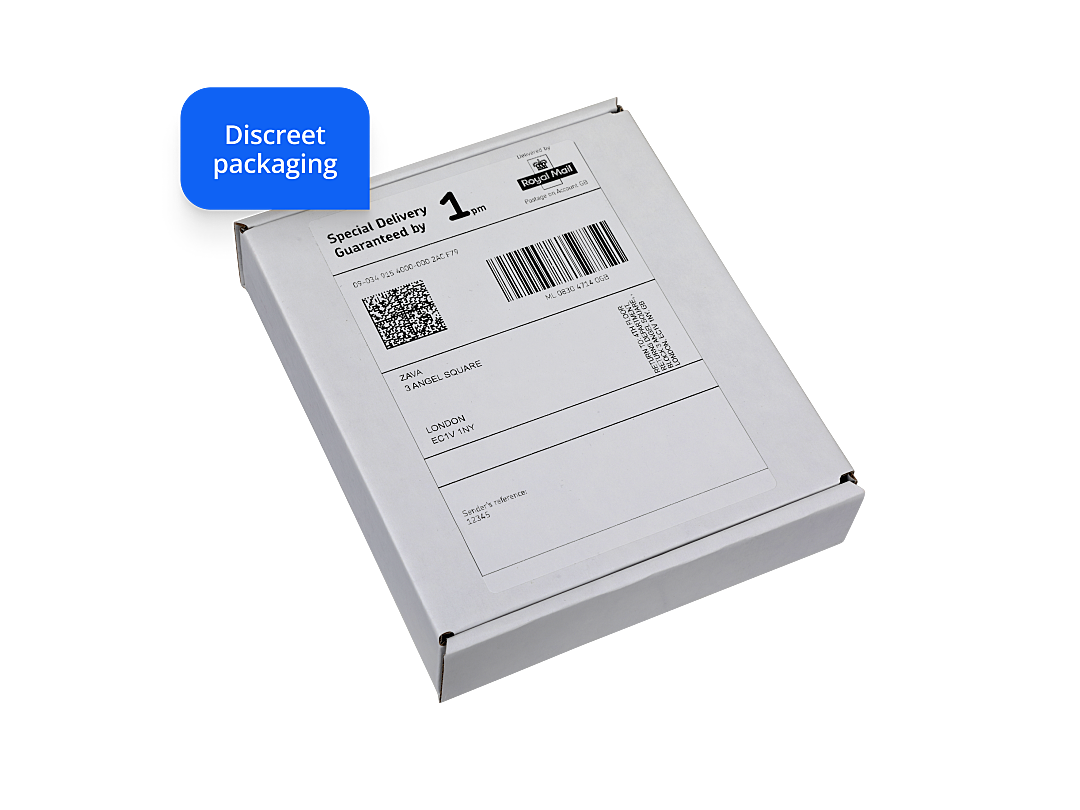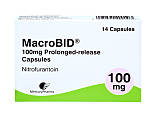Nitrofurantoin
Nitrofurantoin is an antibiotic used to treat common bladder infections such as cystitis.
(13)



In stock. Prices from £22.99
Simply fill in a brief consultation questionnaire and one of our doctors will review your request today.
-
Nitrofurantoin (previously sold as Macrobid) is a type of antibiotic that can be taken to treat urinary tract infections (UTIs), like cystitis. Nitrofurantoin is one of the only recommended first-line antibiotics used to treat cystitis in the UK.
Nitrofurantoin contains the active ingredient nitrofurantoin. A course of treatment for cystitis will usually last 3 days. Take 1 Nitrofurantoin 100mg capsule twice a day for 3 days, with one capsule taken in the morning and another taken in the evening.



About nitrofurantoin
-
-
Nitrofurantoin is a type of antibiotic that can help treat cystitis, a urinary tract infection (UTI).
You might need to take nitrofurantoin on other occasions, to :
- treat kidney infections
- prevent infections in surgery
Nitrofurantoin kills the harmful bacteria found in your urinary tract.
-
-
You should take nitrofurantoin as prescribed by your doctor.
When taking nitrofurantoin, make sure that you:
- swallow the capsule whole
- take the capsule with or after food
To treat cystitis, you take 1 nitrofurantoin 100mg capsule twice a day, for 3 days.
When taking nitrofurantoin twice a day, be sure to space the doses evenly (around 10 to 12 hours apart).
You should finish the whole course of antibiotics, even if you feel better.
How effective is nitrofurantoin at clearing up cystitis?
Nitrofurantoin is very effective in clearing up cystitis and you will feel better within a few days after you take it. After you take nitrofurantoin, your body will pass it through your urinary tract.
Many bacteria found in the urinary tract are sensitive to nitrofurantoin. This means nitrofurantoin is an ideal antibiotic to kill the bacteria which cause cystitis, and clear it up.
How long does nitrofurantoin take to work on cystitis?
Nitrofurantoin should work on cystitis a few hours after you take your first capsule.
You should feel an improvement in the burning sensation when you pee. You may need to pee less often too. To make sure you kill all the bacteria causing the cystitis, it’s important to finish your course of antibiotics. Otherwise, your cystitis can come back or reoccur (‘recurrent cystitis’).
Is nitrofurantoin suitable for recurrent cystitis?
Nitrofurantoin is suitable for recurrent cystitis. If you have the symptoms of cystitis more than 3 times in 12 months, or more than 2 times in 6 months, you may have recurrent cystitis.
If you think you have recurrent cystitis, speak to your doctor for advice. They can arrange tests to look into the reason why your cystitis keeps coming back, and also test your urine to check which antibiotic is best for you. You might be started on a low dose of antibiotics, like nitrofurantoin, to take every day to stop your cystitis coming back.
-
-
Nitrofurantoin can be taken by most adults. If you have certain health conditions or are allergic to nitrofurantoin, you may not be able to take it.
Tell your doctor if you are pregnant or planning on becoming pregnant before you take nitrofurantoin. If you’re pregnant or breastfeeding, it’s likely you’ll be able to take nitrofurantoin safely.
Who shouldn’t take nitrofurantoin?
You should not take nitrofurantoin if you:
- are allergic to nitrofurantoin or any of the ingredients in nitrofurantoin
- have a kidney disease
- have the blood condition porphyria
- are in the final weeks of pregnancy
- have a genetic condition called G6PD (glucose-6-phosphate dehydrogenase) deficiency
- if you are breastfeeding a child with G6PD deficiency
You should speak to a doctor or pharmacist before taking nitrofurantoin if you have:
- diabetes
- any condition affecting your kidneys
- anaemia or a vitamin B deficiency
- a condition that causes weakness or fatigue
- any lung, liver or nervous system problem
- brown or yellow coloured urine
Some medicines can interact with how nitrofurantoin works, so speak to your doctor or pharmacist if you are taking:
- indigestion remedies for heartburn, such as antacids
- gout treatment, such as probenecid
- glaucoma treatment, such as acetazolamide
- any medicines that cause your urine to become less acidic, such as potassium citrate or sodium citrate (a common cystitis remedy)
- certain antibiotics called quinolones, such as ciprofloxacin
You should also tell your doctor or pharmacist if you have recently had a typhoid vaccine.
-
-
Nitrofurantoin is a prescription-only medication. To get a prescription online from ZAVA, you will need to complete a short questionnaire so our doctors can check that nitrofurantoin is suitable before they can prescribe this to you. We will then post your treatment to your preferred address or your nearest Post Office.
Is nitrofurantoin available over the counter?
Nitrofurantoin is not available over the counter from a pharmacy. You can only get nitrofurantoin on prescription after speaking to a doctor or another prescriber about your cystitis symptoms. If you need nitrofurantoin, fill out our online form and a doctor at ZAVA can check if they can prescribe it for you.
-
-
Common side effects
The most common side effect of nitrofurantoin is dark yellow or brown urine (pee).
You may feel like you need to vomit after taking your first nitrofurantoin capsule, however this should pass within a few hours. Make sure you take nitrofurantoin with or after food to reduce any nausea and prevent you from feeling sick.
Uncommon and rare side effects
Rare side effects of nitrofurantoin include:
- aplastic anaemia (producing fewer blood cells)
- collapse
If you take nitrofurantoin and have symptoms of an allergic reaction, call 999 immediately. These can include breathing difficulties or swelling in your face or throat.
Contact your doctor immediately if you have any of the following symptoms after taking nitrofurantoin:
- fatigue, abdominal pain, joint pain or swelling
- flu-like symptoms, fever, diarrhoea or blood in your poo
- blue or purple colour on your skin
- bruising
- yellowing of the skin or the whites of your eyes (jaundice)
- cough or shortness of breath
-
-
There are alternative ways to treat cystitis, but if these do not help and your symptoms get worse, you may need antibiotics.
Make sure that you:
- remember to drink water throughout the day and keep hydrated
- pee as often as you need to, and do not hold it in
- take paracetamol if you can, to help with any pain
- use a hot water bottle or a heated blanket to relieve any discomfort
- avoid having sex until your cystitis completely clears
- avoid tight trousers, leggings or jeans
- wear underwear made from cotton or other natural fibres
When going to the toilet, you should:
- wash your genitals with water or perfume-free soap
- wipe yourself from the front to the back to prevent infections
If you are unable to take nitrofurantoin, there are other treatment options available such as trimethoprim.

Dr Kathryn Basford is a qualified GP who works as a GP in London, as well as with ZAVA. She graduated from the University of Manchester and completed her GP training through Whipps Cross Hospital in London.
Meet our doctorsLast reviewed: 02 Feb 2023
-
Macrobid 100mg prolonged-release capsules Patient Information Leaflet (PIL) [March 2019] [accessed October 2021]
-
Macrobid 100mg prolonged-release capsules Summary of Product Characteristics (SmPC) [March 2019] [accessed October 2021]
-
Nitrofurantoin: British National Formulary online (BNF) [accessed October 2021]
-
Recurrent urinary tract infections Patient Booklet - West Suffolk CCG (NHS) [2016] [accessed October 2021]
-
Cystitis - NHS [August 2018] [accessed October 2021]

GMC: 6149061

GMC: 7074021

GMC: 7155722


Cystitis bladder infections are caused by bacteria and need to be treated with antibiotics. ZAVA offers a variety of treatment through a convenient, discreet service.








